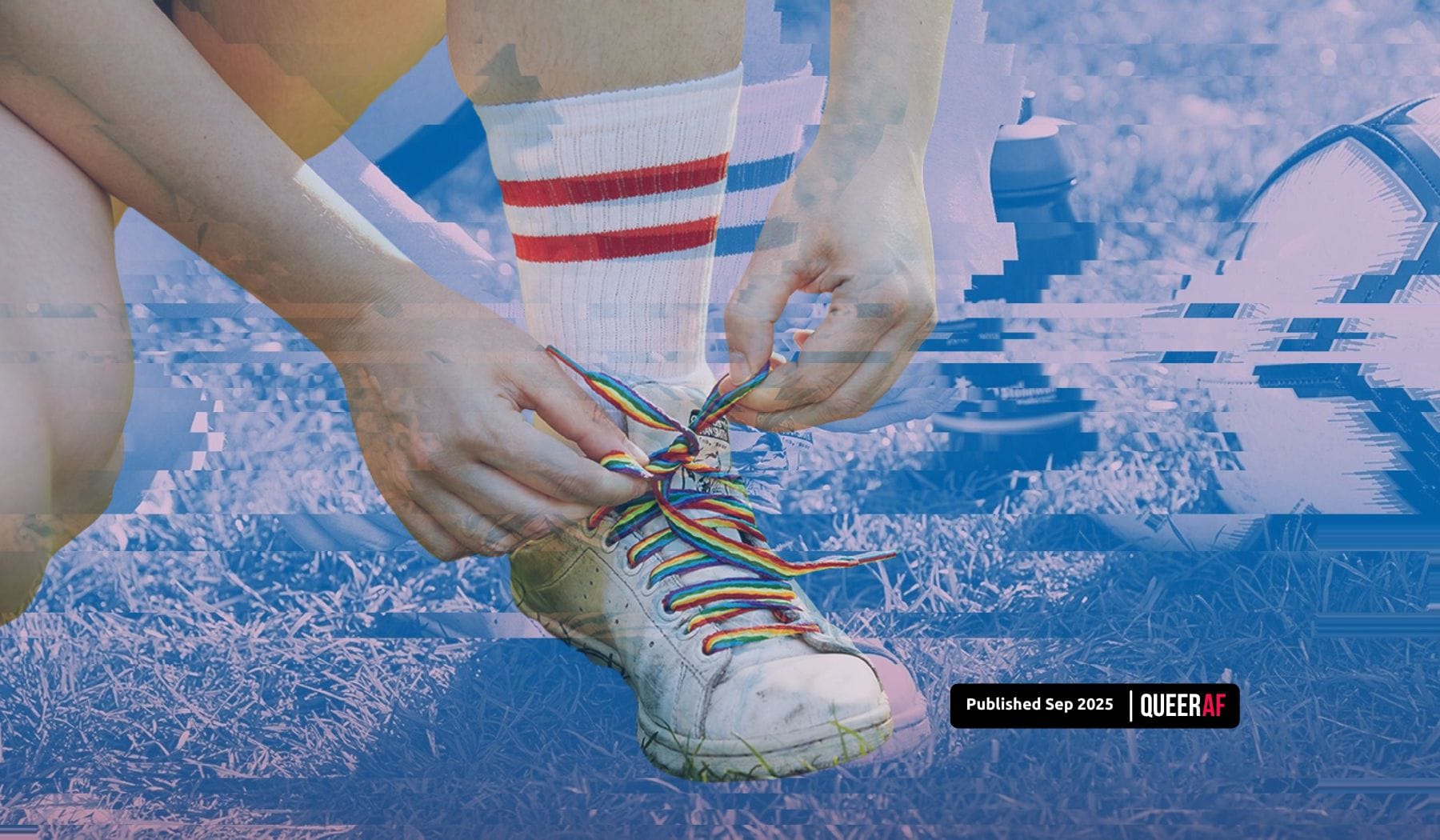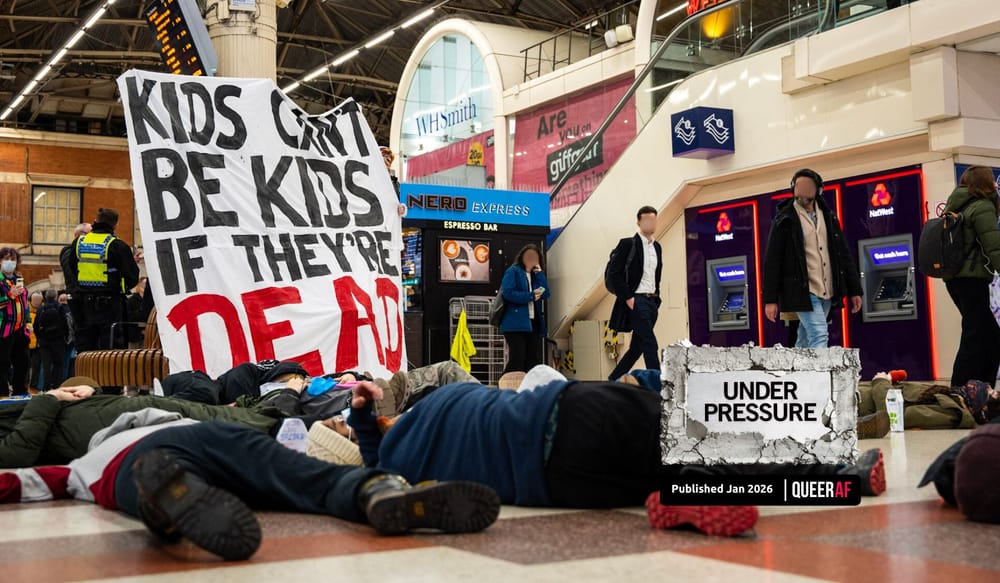
TL;DR: Trans+ athletes are being forced to out themselves because of organisation's possible overreached responses to the Supreme Court ruling on the defintion of a woman under the Equality Act. QueerAF speaks to experts and victims of Trans+ sports bans, about how this might be a breach of their right to privacy which could see legal challenges.
Two transgender athletes say they felt forced to disclose their gender identity to their sports clubs after they were banned from playing women’s cricket and football. It may constitute a human rights breach and could see the England and Wales Cricket Board (ECB) and Football Association (FA) face legal action, QueerAF can reveal.
The athletes have told QueerAF the potential breach of their rights and forced coming out has left them feeling devastated. It left them feeling that their agency had been taken away, and in some cases resulted in feelings of depression.
On May 1 2025, the FA confirmed trans women would no longer be allowed to play women’s football from June 1. A day later, the ECB announced an immediate ban on trans women competing in recreational women’s cricket. Both bodies cited the impact of the UK Supreme Court ruling of 16th April 2025 that the legal definition of a woman in the Equality Act 2010 refers to ‘biological sex’.
One of the trans athletes is in her 70s and transitioned over 30 years ago. QueerAF met with a representative of her cricket club to protect her anonymity. The East Anglian Veterans, which withdrew from the Essex Women’s Premier League in protest of the ECB’s ban, told us she is now experiencing “clinical depression” following the ECB’s ruling.
The trans woman was a valued member of the team and community at her local club, spearheading the talent development of many women’s and girls' teams. The ruling felt particularly acute, because she was due to captain an evening match on the day of the ECB announcement.
“She contacted the Chairman immediately and had to ‘out’ herself to explain why she could no longer remain a member of her beloved club or play with the team,” the club told QueerAF.
But this story isn’t isolated - it’s an example of the problems Trans+ athletes all over the UK are facing since the ruling. Amateur footballer Tammy Hymas feared she would never feel accepted after her transition, until she joined Clapton Community football club, in the sixth tier of English women’s football, two years ago.
“Football had always felt like a space where I could enjoy myself and some of those everyday points of prejudice and oppression didn't exist, because I was just playing football, using my body in a really positive way,” she told QueerAF.
However, the FA’s ban left her devastated. She recalls drafting a WhatsApp message “in tears” to her teammates to explain why she could no longer participate and to enable them to take collective action against the ban.
While Hymas never had to hide her gender identity at Clapton CFC, she believes the autonomy to share personal information on your own terms was taken away from her.
“I no longer felt in control of how I wanted to share information with my teammates about my gender history,” she said.
Why is this happening now? Examining the Equality Act and Supreme Court ruling
The Equality Act 2010 was introduced to legally protect people against discrimination in the workplace and in wider society, and it included specifics about how it would apply to sports.
Section 195 of the act makes it lawful to exclude transgender athletes from “gender affected” activities on the condition that it “is necessary to uphold fair or safe competition, but not otherwise.”
In the case For women Scotland v The Scottish Ministers heard in November 2024, the Supreme Court sought to define the terms “man”, “woman” and “sex” within the Equality Act, and specifically whether these terms include Trans+ people with a gender recognition certificate (GRC).
After five months, the Supreme Court unanimously concluded that these terms referenced what it called ‘biological sex’, which it defined as “the sex of a person at birth”, excluding those with a GRC. However, it emphasised that Trans+ people retain protections based on the protected characteristic of gender reassignment.
The term “sex of a person at birth”, though not defined by the court, has been generally understood as the binary male or female “sex assigned at birth”, a problematic term that excludes intersex people and those with variations in sex characteristics.
Nonetheless, the Equality and Human Rights Commission soon published an ‘update’ blog, on 25th April, instructing organisations to segregate Trans+ people in public single-sex spaces and stating the intention to address competitive sport in further guidance.
The ECB and FA then claimed that, following the Supreme Court ruling and legal counsel they had taken, blanket bans were necessary. As neither have publicised the contents of their legal advice, it remains unclear whether they were legally bound to act.
When approached for comment, an ECB spokesperson reiterated they had to take account of the Supreme Court ruling, saying that changes to eligibility were based on legal advice and that they were still awaiting the Equality and Human Rights Commission’s updated guidance.
An FA spokesperson said the updated transgender policy ensured the FA and County FA network could operate within what they claim is a “new legal framework” following the Supreme Court ruling.
However, all of the changes which both organisations stood by when QueerAF spoke to them for this story took place after the Equality Watchdog’s ‘update’ was published. Due to court proceedings, it had to go to great lengths to say the update was not guidance or statutory advice, but just “some observations – brief and high level”.
What do the experts say about Trans+ sports bans?
Dr Seema Patel, an associate professor of sports law at Nottingham Trent University, is a leading expert on gender discrimination in sport. She authored a 2024 report for FIFA recommending a “more nuanced and collaborative approach” to sport gender eligibility policies.
She points out that the Supreme Court ruling had no relation to sport and argues that more time could have been taken to understand the ruling’s meaning in a sport context.
“We’ve been deliberating over the inclusion of trans females in the female category for years so it’s not a new issue within sport,” she told QueerAF.
“But when something high profile like the Supreme Court ruling comes to light, it inevitably sends shockwaves and causes a lot of emotion, debate and highly politicised views on the issue.”
In her FIFA report, Dr Patel finds the eligibility of trans athletes is questioned by policy-makers because of a perceived unfair biological advantage, but that blanket bans aren’t necessarily the solution due to a lack of evidence surrounding differences.
“Biologists that are making a leap of faith from differences between men and women to differences between females and trans females are ignoring the nuances of the issue,” she said.
“Clearly, there are biological differences, but the evidence is still inconclusive to some extent on the nature of that advantage. I believe it really is a case-by-case basis.”
Now, according to Dr Patel, the Supreme Court ruling has left trans people and their human rights in a vulnerable position which needs addressing.
“I’ve said for many years that sport and human rights come hand in hand and the rights of individuals whether cis female or trans female should not be ignored,” she said.
Analysis: Trans athletes’ experiences raise question of whether sports bodies are violating the right to privacy
Everyone’s right to privacy is enshrined in Article 8 of the European Convention on Human Rights, a charter which the UK is obliged to comply with, but that doesn’t prevent violations occurring.
Even before the Supreme Court ruling, some trans footballers and cricketers endured risks to their privacy in having to ‘out’ themselves to sport administrators just to be eligible to participate.
And now blanket bans have magnified that risk on a huge scale by forcing players to ‘out’ themselves to whole teams and clubs across football in England and cricket in both England and Wales.
So, as has been argued in court applications by advocacy group the Good Law Project against the EHRC with regards to the segregation of Trans+ people from single-sex facilities in workplaces and services, the right to privacy may be breached in sport when a trans person has had no choice but to share their gender identity after being affected by blanket bans in the women’s category.
Whether this argument in such circumstances can progress in the courts is uncertain, however, as there is no existing precedent.
Regardless of this, access to sport and the pleasure and wellbeing benefits it brings should never be a privilege. Yet, the devastating testimonies of trans athletes show us it has been made into a method of disempowerment because of the actions of sporting bodies in the UK.
Trans women and girls have had the freedom to participate and enjoy sport, their sporting families, and, in some cases, their privacy stripped from them. The bans were enacted so quickly that this happened in the space of a month for footballers, and for cricketers, in less than a day.
This grave injustice should leave sports bodies seriously considering whether they have violated the human rights of their own players.

We face an acute period ahead of us in our community:
A time where people who hate us are feeling more and more enabled to share, spread and communicate those attitudes.
In this period of uncertainty, you can trust QueerAF to be here - in your inbox every Saturday, to ensure you have all the latest information you need to navigate the changes, and to know how to fight back.
The kind of journalism we do week in week out, goes far beyond writing the 4000 words in this newsletter every week, or spending all week newsgathering.
It requires us to build relationships with queer organisations, advocacy groups and with activists to ensure our ears are on the ground, and that we can connect the dots - so you're better equipped for the fight ahead.
QueerAF is a small team; for now, I'm the only one who works here full time and on top the news I do, I work with our network of contributors, mentees on our training schemes and freelance staff - to ensure we punch above our weight. We're both small and mighty.
But I'll level with you: we need your help. QueerAF's largest source of revenue is from people like you. That's by design. We've refused ads in this newsletter because it keeps us focused on what counts, not what clicks. It helps us stay grounded with what the community needs.
If you can, please join the hundreds of other QueerAF members who ensure our small but mighty newsletter, can take on the mainstream media and deliver you the information you need for the fight ahead.











